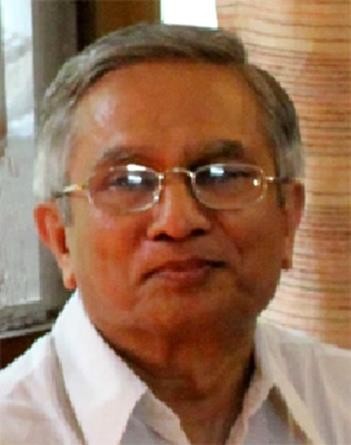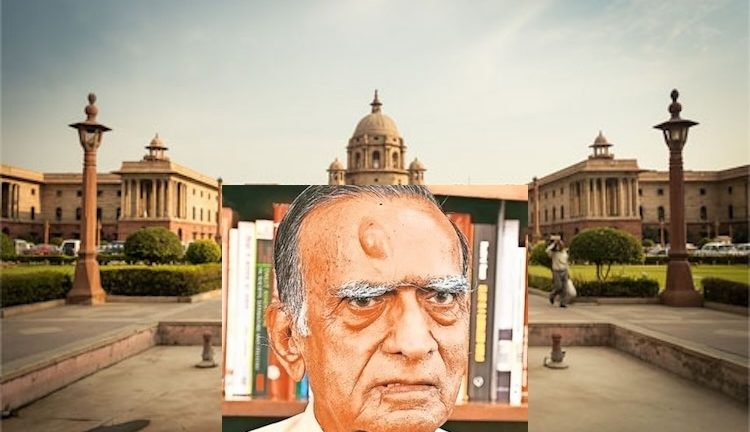Prof. Dubey was an expert on disarmament and development cooperation. He served as India’s foreign secretary in 1990-91, and as India’s High Commissioner to Bangladesh and Permanent Representative to UN Organisations in Geneva. He died on 26 June 2024 at the age of 90.
By Saurabh Kumar*
NEW DELHI | 6 July 2024 (IDN) —I had the privilege of getting to know Mr. Dubey closely; more as a friend, I can say without any pretentiousness, than just as an elder colleague. Thanks to the happenstance of being invited, by him, to join him in his daily evening walk in the Lodi Gardens upon his learning of my working in the IIC Library regularly on my return to New Delhi some years back.

Mr. Dubey was not one given to small talk. Our conversation during these long, hour-plus strolls soon moved away from nostalgia of the halcyon days of the Six Nation Initiative and the Action Plan (for a Nuclear Weapon Free and Non-violent World) presented by late PM Rajiv Gandhi at the Third Special Session of the UN General Assembly on Disarmament in 1988 and the 1987 UN Conference on the Relationship between Disarmament and Development etc. (which he had spearheaded, with me assisting him as the lead officer on Disarmament affairs in the Ministry of External Affairs).
NEW INTERNATIONAL ECONOMIC ORDER (NIEO)
Learning of my interest in the NIEO weltanschauung, he delighted in dwelling on my myriad queries in detail day after day and let me in, so to say, into his rich experience of the NIEO discourse, which emerged in the UN during the time he served there in the sixties in the company of its leading proponents, Raul Prebisch and other luminaries from Latin America, in particular. As is well known, Mr. Dubey had been very closely involved himself in shaping the unfolding of the NIEO in the UN.
It used to be a treat to listen to him recount and review the major landmarks in evolution of the NIEO idea. Replete with stories of human interest about its stalwarts, his recollections were a veritable tour de force. He would be open to questioning, including fundamentally as to what went wrong: why the NIEO construct petered out and, most of all, over the charge that could be levelled against it — of irresponsible rhetoricalism, running way ahead of ground reality, that ended up paving the way for its dissolution within a decade or so of its high noon, as a result of the reactionary rightward shift in Western political stance and public opinion wrought by Mrs. Thatcher and Ronald Reagan. (And, more importantly perhaps, for rolling back of the very idea of the ‘welfare State’, in favour of a conception of the State as a mere enabler and facilitator of market led growth, that came to prevail in international discourse not long after, standing the NIEO vision on its head, as it were.)
THE MAN
It was during those perambulations that I got to know Mr. Dubey, the man, behind Mr. Dubey, the professional. He had been synonymised with his flashes of temper, and impatience with imperfection, but his outbursts stemmed from the obverse side of a one-of-its-kind gene, of zero-tolerance for shoddiness and slackness, that he can hardly be blamed for! From an uncompromising, and therefore unforgiving, expectation of thoroughness from all around him. On the contrary, there was a lighter side to his persona as well, which not many are familiar with. His laughter was even more mercurial, if it could be put in that contradictory manner. There was a child like innocence to it. His laughs came from the bottom of his heart, lighting his face all over, his eyes inviting approbation and sharing.
That endearing aspect of his personality stemmed from a deeper quality, I think, which was of a persona that never forgot its humble origins and remained true to its roots. Of the little boy who grew up in none too comfortable circumstances but broke successive academic records and barriers, childhood onwards, and somehow managed to get higher education, entirely on his own steam through sheer grit to make it good.
It was a record that included a brush with student politics in the University. That almost blocked the mandatory security clearance for him after successfully competing in the UPSC examination for the Foreign Service, by far his first love and choice. One of his Professors, a senior Patna College academic with access to Pandit Nehru, swung it for the V K Krishna Menon hero-worshipping, burning with ambition lad he had mentored, else the IFS (and the UN Secretariat), might have been the poorer for it.
There lies the key to understanding Mr. Dubey’s post-retirement turn towards the domestic development agenda, rich in its contributions to the socio-economic policy discourse in the country no less than those to foreign policy and diplomacy.
COUNCIL FOR SOCIAL DEVELOPMENT (CSD)
I had the good fortune of sharing that engagement with the development problematique with him in recent times, following his gracious invitation to me to join the Council for Social Development. ‘Mornings, evenings, afternoons, we spent our days with coffee spoons’ in IIC (one could say of our recent interaction without exaggeration, taking off from Eliot!), storming our brains for ways the run-away consumerism in the country in imitation of the neo-liberal economic growth model of the industrialised economies, China included, could be stemmed. He strove to keep the CSD anchored in an enlightened ‘inclusive development’ orientation, unbothered by the fact that that was no longer a ‘fashionable’ intellectual pursuit as in his heyday in the UN. (The tribute often paid to the concept of inclusive development, in political discourse, routinely through ubiquitous lip service, he dismissed with characteristic categoricalness and candour as humbug, akin to vice paying tribute to virtue.)
THE GITA
Mr. Dubey was a determined achiever, who placed man’s mission in life squarely within the karma yogic credo “yogah karmasu kaushalam” (skill – excellence — in action). A great believer in the Gita as a source of strength, he valued ambition and prized its single-minded pursuit, untrammeled by self-doubt.
It was a trait he rated very highly (along with disdain, equally, for those lacking in drive and push to ‘succeed’!). That paradox has to be seen and understood, I think, in the light of the struggle he had to undergo in his formative years, which left him yearning for recognition. Likewise, his valorization of success in worldly terms.
Our last discussions, before my move to Madurai about four months back, had veered around to the nishkama karma construct – reconciling the contradiction between the self-projection demanded by the careerist approach to life and the profound message of the Gita for the higher Self (of exhortation for ‘action is thine, results divine’ kind of striving to discharge one’s duties duly, without longing for rewards, letting go of attachment to fruits of action). And the dilemma of its being reduced, widespread, to a value-neutral ‘algorithm’, almost, in the service of the self even as the profession is to lofty philosophical enunciations.
So also, wonderment at the meditative practice (sadhna) of the dhyan yoga tenet of reining in the wanderings of the mind (“yogah chittavritti nirodha”) and jnana yoga precepts of use of reason (vichaar) and discretion (vivek) to rise above attachment to outcomes in order to be able to act with equanimity at all times (“samatvam yoga uchyate”) getting misdirected, or limited, to narrow, self-seeking pathways.
It was the ultimate privilege to have had a chance to engage a person of Mr. Dubey’s calibre in dialogue on some of these themes, offshoots of the larger question of the ethical life beyond the ‘visible to the world’ radar. An opportunity that I will sorely miss now.
Rest in peace, revered agraja (अग्रज); you leave behind a formidable legacy of ideas and initiatives for your associates to mull over and strive to take forward.
Prof. Saurabh Kumar has had a distinguished career in diplomacy and academics. Post-retirement from the Indian Foreign Service (IFS), he served on the Faculty of the National Institute of Advanced Studies (NIAS), Bangalore during 2010-20. In the IFS, he held three Ambassadorial assignments, last as India’s Governor on the Board of Governors of the International Atomic Energy Agency and Ambassador to the IAEA, UNIDO and the UN Offices in Vienna (and to Austria concurrently). He is also authored the Occasional Paper, “Galvanising the Ship of the IndIjdsian State: An Agenda for Research and Dialogue“ for the prestigious India International Centre in New Delhi. [IDN-InDepthNews]
Collage shows Prof. Muchkund Dubey against the backdrop of the India’s Ministry of External Affairs (MEA) with pictures from the Indian Express and MEA.


